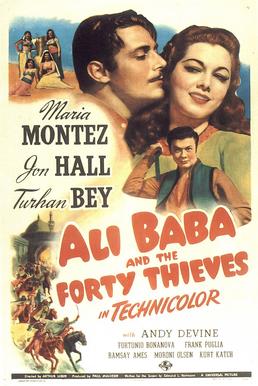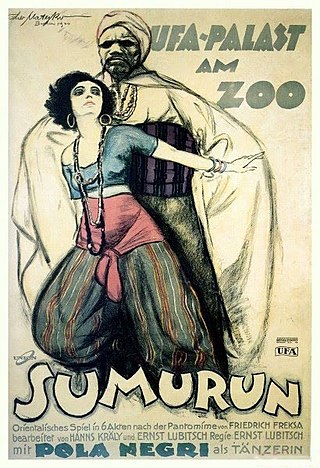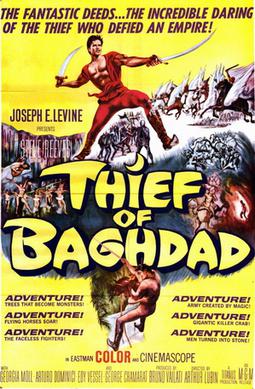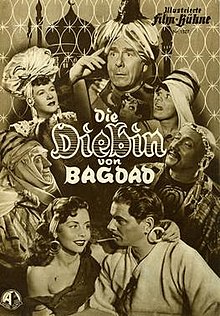
The Thief of Bagdad is a 1924 American silent adventure film directed by Raoul Walsh and starring Douglas Fairbanks, and written by Achmed Abdullah and Lotta Woods. Freely adapted from One Thousand and One Nights, it tells the story of a thief who falls in love with the daughter of the Caliph of Baghdad. In 1996, the film was selected for preservation in the United States National Film Registry by the Library of Congress as being "culturally, historically, or aesthetically significant".

Abū’l-Faḍl Jaʿfar ibn Aḥmad ibn Ṭalḥa ibn Jaʿfar ibn Muḥammad ibn Hārūn Al-Muqtadir bi'Llāh, better known by his regnal name al-Muqtadir bi'Llāh, was the eighteenth caliph of the Abbasid Caliphate from 908 to 932 AD, with the exception of a brief deposition in favour of al-Qahir in 929.

Arabian Nights is a two-part 2000 miniseries, adapted by Peter Barnes from Sir Richard Francis Burton's translation of the medieval epic One Thousand and One Nights. Mili Avital and Dougray Scott star as Scheherazade and Shahryar respectively. Produced by Dyson Lovell and directed by Steve Barron, the serial was produced by Hallmark Entertainment and originally broadcast over two nights on 30 April and 1 May 2000 on BBC One in the United Kingdom and ABC in the United States.

Kismet is a 1944 American Metro-Goldwyn-Mayer film in Technicolor starring Ronald Colman, Marlene Dietrich, Joy Page, and Florence Bates. James Craig played the young Caliph of Baghdad, and Edward Arnold was the treacherous Grand Vizier. It was directed by William Dieterle, but was not a success at the box office. Dieterle had directed Dietrich two decades before in the German silent film Man by the Wayside, which was both the first role in which Dietrich was cast competitively and Dieterle's directorial debut.

Ali Baba Bujang Lapok is a 1961 Singaporean Malay-language black-and-white comedy film directed by, written by and starring Malaysian silver-screen legend P. Ramlee and produced in Singapore by Malay Film Productions Ltd. Based loosely on the story of Ali Baba from 1001 Arabian Nights, the film is occasionally self-referential and contains elements of anarchic comedy, burlesque comedy, satire and farce. The title includes the suffix Bujang Lapok because it is the third instalment in the Bujang Lapok series of comedy films that star the trio of P. Ramlee, S. Shamsuddin and Aziz Sattar. This film marked the feature film debut of Sarimah, who would go on to a long movie career, and is also notable as one of the few P. Ramlee films where he plays the villain.

Arabian Nights is a 1942 adventure film directed by John Rawlins and starring Jon Hall, Maria Montez, Sabu and Leif Erikson. The film is derived from The Book of One Thousand and One Nights but owes more to the imagination of Universal Pictures than the original Arabian stories. Unlike The Thief of Bagdad (1940) and other films in the genre, it features no monsters or supernatural elements.
A-Lad-In His Lamp is a 1948 Warner Bros. Looney Tunes cartoon. The short stars Bugs Bunny, and features the Genie and Caliph Hassan Pfeffer, who is after Bugs and the genie in his lamp. The voices of Bugs Bunny and Caliph Hassan Pfeffer are voiced by Mel Blanc, and the voice of the genie is played by Jim Backus. The cartoon is a takeoff of the story of Aladdin's Lamp. Elements of this short would later be re-used for the Arabian era in Bugs Bunny & Taz: Time Busters.

Son of Sinbad is a 1955 American adventure film directed by Ted Tetzlaff. It takes place in the Middle East and consists of a wide variety of characters, including over 127 women.

Kismet is a 1955 American musical-comedy film directed by Vincente Minnelli and produced by Arthur Freed. It was filmed in CinemaScope and Eastmancolor and released by Metro-Goldwyn-Mayer.

A Thousand and One Nights is a 1945 tongue-in-cheek American adventure fantasy film set in the Baghdad of the One Thousand and One Nights, directed by Alfred E. Green and starring Evelyn Keyes, Phil Silvers, Adele Jergens and Cornel Wilde.

Ali Baba and the Forty Thieves is a 1944 adventure film from Universal Pictures, directed by Arthur Lubin, and starring Maria Montez, Jon Hall, and Turhan Bey. The film is derived from The Book of One Thousand and One Nights, but its storyline departs greatly from the folk tale of the same name, wedding that story to an actual historic event. The film is one of series of "exotic" tales released by Universal during the Second World War; others include Cobra Woman, Arabian Nights, and White Savage.

The Golden Blade is a 1953 American adventure film directed by Nathan Juran and starring Rock Hudson as Harun Al-Rashid and Piper Laurie as Princess Khairuzan. It is set in ancient Bagdad and borrows from the Arabic fairy tales of One Thousand and One Nights as well as the myth of King Arthur and the Sword in the Stone.

La Rosa di Bagdad is a 1949 Italian animated film by Anton Gino Domeneghini. In 1952, the film was dubbed into English, retitled The Singing Princess and dubbed by Julie Andrews as her first venture into voice-over work. The film was reissued in 1967, at the height of Andrews' subsequent Hollywood career. It is often cited as one of the first animated films from Europe and in Technicolor together with The Dynamite Brothers. It is also Italy's first film in Technicolor.

Sumurun is a 1920 German silent film directed by Ernst Lubitsch based on a pantomime by Friedrich Freksa.

Sonja Alice Selma Toni Ziemann was a German film and television actress. In the 1950s, she was among Germany's most prominent actresses, awarded the 1950 Bambi for appearing, together with Rudolf Prack, in Schwarzwaldmädel. From the 1960s, she turned to more serious acting in international films such as The Secret Ways. She played in several anti-war films such as Strafbataillon 999. She also appeared on stage and in television.

The Thief of Baghdad is a 1961 film directed by Arthur Lubin and starring Steve Reeves.

Twisted: The Untold Story of a Royal Vizier is a musical with music by A. J. Holmes, lyrics by Kaley McMahon, and a book by Matt Lang, Nick Lang, and Eric Kahn Gale. It was produced by StarKid Productions.

The Thief of Baghdad is a 1978 fantasy film directed by Clive Donner and starring Roddy MacDowall and Kabir Bedi. A British and French co-production, the film was released theatrically, except for the United States where it debuted on television.

The Sword of Ali Baba is a 1965 American adventure film from Universal Pictures, directed by Virgil W. Vogel and written by Edmund Hartmann and Oscar Brodney. The film stars Peter Mann, Jocelyn Lane, Frank McGrath, Gavin MacLeod, Frank Puglia, and Peter Whitney and is a remake of the 1944 film Ali Baba and the Forty Thives, which was derived from The Book of One Thousand and One Nights and the tale of the same name.


















